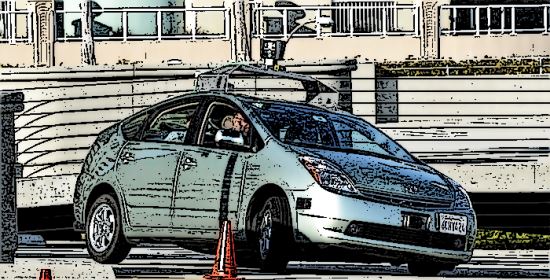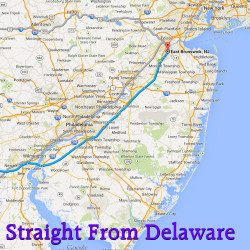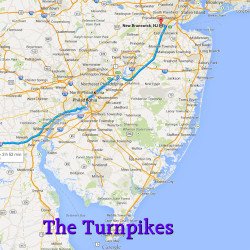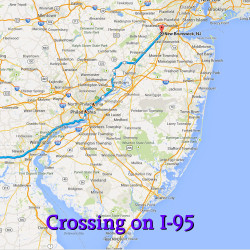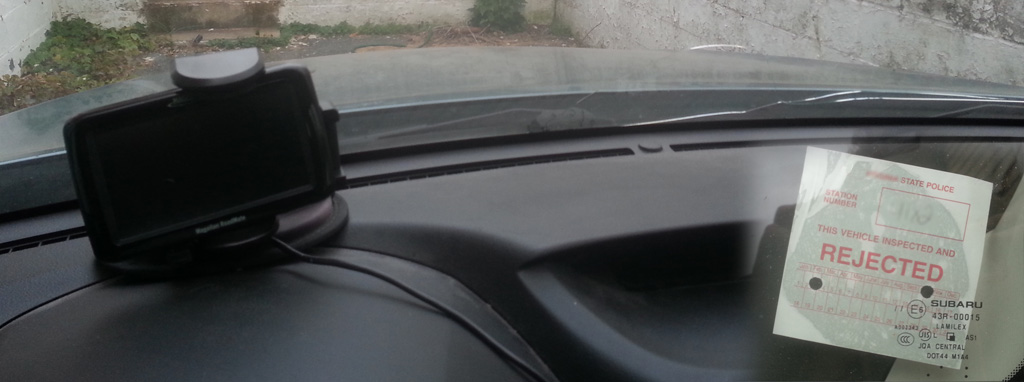Category Archives: Road
According to University of Texas professor Chandra Bhat, driverless cars may be bad for the environment. To be fair, that has as much to do with headline writers as it does with what Bhat himself has to say in the interview which is more wide-ranging.
On the environmental front, Bhat’s prediction has three components:
- People will start to want a more comfortable or productive workspace in their cars if they’re spending that time relaxing or working instead of driving. This would undo and perhaps reverse the slow and steady progress towards smaller vehicles.
- Since driving will be a less frustrating experience, people will be willing to work further away from home.
- Driverless cars would negate the advantages of public transportation. This one he only hints at.
I think this takes a shorter view of the opportunities that driverless cars represent. As the notion evolves, I think that robocars would actually change the dynamics of car ownership. Most specifically, a lot of people wouldn’t need to own one. Instead it would be Zipcar writ large, except that instead of having to find an available car, the car you need will be able to drive to your curb.
I’d argue that this would more likely enable cars to get smaller, generally, rather than larger. As it stands, we tend to drive cars with excess capacity for those rare times when we need said capacity. All of my cars have had room for four or five even though the vast majority of the time it’s only had one or two people in it. Almost always one until we had the baby. But it sucks to need space and not have it, so you get the larger model. Right now we have a Subaru Forester when for the most part the Camry suits out needs. But the Forester is very helpful for those times when we need the capacity. But if I could call that capacity to my curb whenever I needed it, we could probably do without it. And if I don’t want to own a car, I can get the equivalent of a golf cart for many trips.
More broadly than myself, the vast majority of pickups would become unnecessary. A large number of SUV’s would as well. If we had enough rent-a-rides out there, most vans would become unnecessary as well. We could adjust the vehicle size to our needs rather than having such persistent over-capacity. The economic advantages of small cars wouldn’t change. The big difference would be those who prefer smaller cars because they don’t like driving and parking larger vehicles. I actually fall into this category, but I don’t think it’s all that common. For most people, the equivalent of a passenger’s seat is fine most of the time.
The biggest danger to the environment is, interestingly enough, the logistical improvements. I almost wrote “gas won’t be any cheaper” in the previous paragraph, but it could in the sense that these vehicles will be inherently more fuel efficient and therefore you run into the issue of losing fuel economy gains by driving/riding more miles. This leads into Bhat’s second rationale, which is commute distances.
If robocars can get you there faster, you could well be content having a job further away from work if for no other reason than that it doesn’t take you more time. That you will be able to spend that time relaxing is an added benefit, though it’s one that is easily overstated. If you have a family, time in the car is time away from that family.
A shift away from public transportation would likely occur. Given that we’re talking about the USA, though, it’s not as though public transportation is heavily used anyway. Unlike others, I’m not hugely optimistic that it really will be on any large scale. This is probably why Bhat didn’t emphasize this point.
On the other hand, it would actually capture not only the psychological benefits of public transportation, but also many of the environmental benefits. With cars being on call, we could greatly reduce the amount of parking space required. This would, in turn, make for a greater walking experience. While this wouldn’t do anything to improve the walkability of suburbs with big lawns and whatnot, it might make them less desirable because living near commercial centers would mean a lot less walking along parking lots.
This is all longer term stuff, of course. It would probably take time, or an economic shift or struggle, to make these changes more likely. But I think the environmental impact of robocars would on the net be positive. It’s only a loss if you envision a green future that I think, owing to the most likely circumstances that would necessitate it, is best out of reach.
So last weekend to took a trip to The Second Kingdom of Jersey. The maps will say New Brunswick or East Brunswick. That’s not quite right, though. The important part of the maps are three different ways of entering Real Life New Jersey.
The obvious way is straight from Delaware. I had been warned from multiple sources that this is actually not a good route to go and that instead I should go through Philadelphia.
Apparently there is a joke/observation in RLNJ that they never toll you coming in. Yet miraculously, I found out the one entrance where they do. In fact, exiting I-95 and going through Bristol and to the Penna Turnpike, they have you get a ticket and pay a $2.00 toll some 300 yards later. Most expensive toll driving ever. Especially when, contrary to the joke/observation, New Jersey asks for a toll some 1000 yards after I crossed the state line (not a toll to enter Jersey, precisely, but a toll station I guess I happened to run across right after entering the Garden State.
Being not-from-the-east-coast I am not particularly used to toll roads on major intersections, but I am getting used to it. Even so, $6.00 for such a small stretch was just galling.
On the way back it had me crossing while on I-95, which had me almost going straight out of Jersey, it seemed. I drove a really long stretch of Pennsylvania Interstate and, unlike the 300 yards, they didn’t collect a dime from me. So I guess it sort of evened out.
Oddly, one of my GPS apps suggested that I go through Harrisburg. Sounds interesting. Might do that next time.
Dylan Matthews wants to fire the TSA.
The best literature review available on the efficacy of counterterrorism tactics found that, on average, adding metal detectors and security screenings at airports led to about 6.3 fewer airplane hijackings in the years examined (a hijinking-heavy period chronicled in Brendan Koerner’s latest book, in case you’re interested). But that was more than compensated for by an increase in “miscellaneous bombings, armed attacks, hostage taking, and events which included death or wounded individuals (as opposed to non-casualty incidents) in both the short and long run.” In fact, metal detectors and security screenings at airports led to about 6.8 more of these substitute events. “When calculating the overall weighted mean effect size for all of the findings examining the effectiveness of metal detectors, the positive and harmful effects cancel each other out,” the review’s authors conclude.
This is likely to fall on deaf ears in the US because, well, we haven’t seen a non-airport attack in a very long time. So people don’t think the terrorists would try to bomb a building.
As I’ve mentioned before, though, fortunately our adversaries are quite unimaginative, though, and it seems like they are focused primarily on planes (excluding attacks on foreign soil, though). I actually can’t help but wonder if the additional security isn’t a part of why. It’s like the bat-signal on Batman’s chest: It’s there to draw fire because it’s the most protected. Not that it’s the most protected because of the security theater, mind you, but it’s the place where people are on the lookout.
Of course, the primary victory of 9/11 wasn’t the hijacking of the planes at all, which has a tendency to get lost in the discussion. The victory was what they did with the planes. Something I doubt they will ever, ever be able to do again. But I’d much rather they try than that they reassess the places where we are actually much more vulnerable.
FastCompany argues that the economic impact of robocars will blow our minds.
When I think about the things that excite me about the prospect of robocars, not having to pay attention during transit is relatively low on my list. The more exciting aspects have to do with system-wide improvements. The above article focuses on the money saved from car accidents. That’s just the tip of the iceburg, though. The biggest thing, especially once these things can drive themselves without occupants, is that car ownership itself will become obsolete. The line between private car ownership and public transportation will become blurred in a way that everyone will benefit from.
It’s also pretty cool if it ends up in our revising our notions of “speed limits.”
Alex Dykes thinks so:
Smart FourTwo – At $13,270 the Smart sounds like a great idea. Until you look at the price and discover a Nissan Versa sedan is 10% cheaper, seats 150% more people, carries more stuff, gets better fuel economy and has a transmission that doesn’t shift like a drunk 14 year old learning to drive a stick. If you really must own a 3-cylinder conveyance in America, get a 3-cylinder Fiesta or a Mitsubishi Mirage.
So does that make a Smart a purchase for conspicuity? Perhaps. About the only big selling point remaining on the Smart, if price and mileage are out of the way, is a genuine preference for a microcar. I remember when I was in Zaulem Sound, one of the selling points of Smarts was that they would be easier for parking and – presumably – traffic navigation.
It’s worth noting that the Versa’s increased mileage is a more recent development. Back when I was looking at economy cars in Zaulem, the Versa had among the worst mileage in the class and no non-hybrid really competed with the Smart. So… is this indicative that CAFE standards are working? It seems that the non-hybrid, non-microcars have been improving within the last couple of years.
We were, to no great surprise, a little late arriving to the airport. I cycled around the airport a couple of times to try to find the economy lot, but it was simply nowhere to be found. I ended up parking at the daily lot, which was very convenient though will be more expensive.
The car parked next to me had glasses sitting on the roof. I felt bad about that because somebody is going to miss them and they’re likely not going to be there whenever somebody gets back.
As per usual, I dropped Clancy off prior to parking. So I arrived independent of her and was checking in by myself. She had texted me, but I hadn’t looked. The kiosk informed me that I was within an hour of takeoff time and notified me that if I wanted to, I could pay a little extra to speed through some lines. I declined. Afterwards, it informed me that my flight time was delayed by 90 minutes or so and that my new flight time was roughly 7:15 instead of 5:45. I can only imagine how I would have felt if I’d paid extra to speed through lines only to wait at the gate for a delayed flight.
The reason for the delay were some weather difficulties preventing the arrival from the plane from Colosse to Queen City (to go back from QC to Colosse on our flight).
Owing, perhaps, to the delay and the havoc wrook on the runway scheduling, we were barely out of the gate before the next round of delays started. We were probably waiting there on the runway for another hour. It was hot and uncomfortable. Lain was unhappy, as was every other baby on the flight. Clancy, bless her, was taking care of the little one. I, meanwhile, was able to watch my TV show on my tablet during the entire wait, throughout the entire flight, and during landing. Thanks Obama.
I was two when we left Peterborough. I wasn’t born there, as Mom was bound and determined not to have another child at the hospital where my brother was born and where she miscarried in between us. I have no memories of the place. But I have heard a lot about it over the years. Very little of it flattering. Dad was unhappy there. Mom liked being close to her family. But it was a relatively small town with not much to do (on comparison to the second largest city in the country, where they had moved from). There was one TV network and they talk a lot about how terrible the news program was there. (One broadcast, when Peterborough was suffering from power outages, they referred to “power outrages” the entire broadcast because their teleprompter had no editor.)
But the place has always had a mythical quality about it, to me. Having lived my entire life in Colosse, it was this weird other place that I had, though I couldn’t remember it, lived. That sort of thing touches your imagination when you are ten. In our computer-based baseball league, I put my team in Peterborough. When we determined that we were moving here, having Peterborough as one of the nearest cities was a plus (albeit a miniscule one). I thought I would be making regular trips the same way I did to Redstone when we were in Arapaho, but Royal Crossing, where we live, actually has most of what we need and Peterborough being a relatively not-wealthy town meant it had less amenities than equally sized towns about the same distance away (including the town where I was born), in a different state than Stonebridge and Peterborough.
 We have a bit of a problem in the Himmelreich-Truman household at the moment with the baby’s newfound ability and love of throwing clothes around. Combine that with her ability to move herself, and she just loves taking her clothes – placed in stacked openface crates in her room – and throw them around. It became apparent that we needed some chester drawers*. So I’ve been looking at Craigslist ever since. I found some at a used furniture-appliance place out in Peterborough.
We have a bit of a problem in the Himmelreich-Truman household at the moment with the baby’s newfound ability and love of throwing clothes around. Combine that with her ability to move herself, and she just loves taking her clothes – placed in stacked openface crates in her room – and throw them around. It became apparent that we needed some chester drawers*. So I’ve been looking at Craigslist ever since. I found some at a used furniture-appliance place out in Peterborough.
I called my mother on the drive to ask the address of the old place. Though my time up there was limited, I did manage to stop by there**. It’s the first time I’ve actually seen the house that they brought me home to. I’d seen pictures before, but there’s never been any cause for us to go to Peterborough and see it. I was taken aback by how large the house was. It looks larger than the house I was raised in, which is interesting given that they didn’t even have kids when they moved there. It was also in a really nice neighborhood, which I was also not expecting. One of the things Mom talks about the most with regard to Peterborough was how absolutely terrible the local school was.
Overall, the trip was not a success. The chester didn’t fit into the Forester with the baby and babyseat. Because I forgot the milk, I couldn’t take my time there. I got some coffee for the drive home and it was awful. I went through nicotine withdrawal and the nice new ecigarette cartridge I opened didn’t work right. The sun was in my eyes on the drive home. My agitation brought out the agitation in Lain, who was crying for much of the drive home. I will probably be going back to Peterborough sans baby because the chester was actually pretty nice.
* – Yes, technically, it is chest of drawers, but when I was young I thought it was chester and I like that better.
** – I also drove by the prison. Peterborough is known for its prison insofar as the town’s name was shorthand for “prison” (“You’ll do a stint in Peterborough if you don’t cooperate!”) on a specific cop drama.
I recently took a trip to a strange and wondrous land called New Jersey. You won’t find it on the Trumanverse map. It exists on that other map, to the east of Real-Life Pennsylvania and the south of Real-Life New York.
New Jersey is a strange land of quaint, strange customs as well as futuristic technology. Unlike in the real world, when you refill your gas tank there, you simply park and someone will come out and pour your gas for you. Fascinatingly, gasoline in New Jersey is cheaper than it is in the surrounding area.
While someone pours your gas for you, when you go inside their commerce hut – WaWas, it is called – they do not have someone there to take your order. Instead, you order it in a futuristic touchscreen panel. After which, you can either take your receipt to a counter where they do still have human-persons to collect your money, or alternately you wait and collect the food (prepared by human-persons, without any further direction than what you typed into the touchscreen).
On the whole, both added to my enjoyment of the trip. I was warned by the natives that there might be a wait at the gas pump, but there was none. The food from the commerce hut was tasty – if on the expensive side – and it was a pleasure not to have to deal with people.
I was going to do another entry on this nightmarish land called Real-Life Delaware, which is to Real-Life New Jersey’s south. I never left the car in Delaware, merely driving through the northern tip of it. For which, I paid a whopping $5 for the privilege. Which is all I really have to say about Delaware.
In addition to having to get a new driver’s license and car registration, Queenland also has state safety inspections. It’s been a little while since I’ve had to contend with them,, and honestly it’s never been a problem when I have. Until now, anyway.
The Toyota had a problem with the exhaust pipe, which the inspector made a clean $400 off fixing. We could have gotten a second opinion, but we gave them the benefit of the doubt in part because they’re the only inspection station around here and such chores become surprisingly more difficult when you have a baby. And besides, the car is approaching twenty years old. We expect problems to occur.
The Forester had a more verifiable problem. Not long after we got it, we got a crack in the windshield. The crack has been growing in fits and starts ever since. Fortunately, though, it doesn’t affect visibility unless you count my ability to clearly see my front hood. The previous state that I lived in which required safety inspections only cared if it was in the line of sight, but Queenland apparently sees (haha, no pun intended) it differently.
This is not, strictly speaking, a matter of freedom. There are certainly negative externalities when it comes to unsafe cars on the road. If my visibility were obstructed, it would represent a hazard first and foremost to myself, but also to others. Acknowledged.
It reminded me of James K’s post on the price of safety at League of Ordinary Gentlemen. I recommend reading the whole thing. The comment thread runs 370 comments long and, alas, nothing gets resolved. Within the comments, Mr. Blue actually comments about auto inspections being an example of safety regulations unduly impacting the poor (oddly enough, relating back to when he failed inspection for a cracked windshield). He backs off it a bit as not being the best example, but I think it’s a great point. Especially in light of what I was tagged for.
Replacing the windshield was no real burden on my part. It was less than the exhaust repair. But it’s a pretty clear case of something where the danger to myself – much less others – was positively minimal. While $250 isn’t much for me, it is a significant burden for some people. All for access to the thing they need to make money to do things like repair cars with actual problems.
A fair number of accidents on the road may indeed be attributable to car malfunction, but that shouldn’t be the question. The question should be the extent to which an annual (or less) check of certain things reduces them to any significant degree. And whether each thing we are forcing people to address, in itself, would save lives. How many lives, and at what cost?
It’s worth noting that my stance here is not some right-field hyperlibertarian one. Officials in no less than Washington DC came to the same conclusion and chose to junk inspections altogether:
The District of Columbia recently decided that its periodic motor vehicle safety inspections were flab. Performed at a D.C. facility along with emissions tests, the safety checks were junked for an annual savings of about $400,000. In justifying the cut, the D.C. Council cited a lack of data proving periodic safety inspections save lives.
Safety advocates, who’ve worked to expand periodic safety inspections beyond the 19 states that still require them, worry that others will decide to rethink the cost. They acknowledge that the way crashes are reported makes good data hard to come by, but argue that the current economy makes it even more important to check that drivers are maintaining their vehicles.
“Safety inspections are particularly needed in hard economic times, because when you’re on a tight budget, you tend to skip the badly needed maintenance,” says Clarence Ditlow, executive director of the Center for Automotive Safety advocacy group.
Like a broken windshield that obscures my view of the front hood! More seriously, the only danger is that a crack is more likely to explode into something else in the event of a major accident. That’s not nothing, but the aggregate costs of these checks are enormous. To the extent that there are externalities to be addressed, there is already a venue to do so: insurance companies. An optional inspection for a cut on your insurance rate could price out the total costs quite easily. They’d certainly have an incentive to know how much that would save in lives and property damage.
Now, you might say “Ah-ha! Insurance companies favor inspections!” I don’t know that this is true, but I bet it is. Even if it is, though, why shouldn’t they? Even if it does absolutely no good, it doesn’t cost them a dime. Let them put their money where their mouth is, if this is important. They don’t even have to wait for a state to end auto inspections. Most states don’t presently have them.
It’s a great speech, though somewhat undermined by the fact that you’re dead for part of the first second after impact.
I do like this commercial for seatbelts:
I remember my father describing to me a commercial about life jackets. It involved a couple of kids sitting on a boatzoomed-in like, holding each other and looking scared. The camera pans out, and you see that they are alone on a boat and their father is floating dead in the water. The argument being “if not for yourself, then for your children.”
It’s a pretty solid concept. One of the effects that fatherhood has had on me is a greater degree of safety-consciousness. Which is kind of a weird way to look at it, but it sort of feels like I don’t have the right to die stupidly, as much as I used to.

